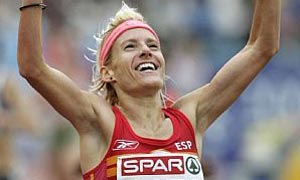
Another Civil Guard doping bust and another sports star is suspected of having cheated their way to the top. This time, it is Marta Domínguez, the world steeplechase champion, whose house was raided on December 9 to reveal enough illegal doping products, including EPO, for her to be suspected of supplying other athletes, Spanish media has reported.
Domínguez was one of 14 people, mainly from the world of athletics, who were arrested as part of “Operation Galgo” (she was later released pending investigation). Others included her trainer César Pérez, the highly regarded coach Manuel Pascua and former 3,000m runner Alberto García.
But it is the apparent fall from grace of Domínguez, 35, that is the biggest shock, due to her down-to-earth, hardworking image. The golden girl of Spanish athletics is pregnant and taking time off from competition, with a view to retiring after the 2012 Olympics. Her 2009 steeplechase triumph in Berlin was the crowning moment of a career that had already seen her take two World silver medals in the 5,000m and two European golds at that distance.
Yet while Domínguez’s arrest was the most shocking outcome of this case so far, another big name, with a less wholesome ring to it, was also on the Civil Guard’s list as they carried out their swoop on targets across Spain: Eufemiano Fuentes. Ostensibly a Canary Islands-based gynaecologist, Fuentes was at the centre of the Civil Guard’s massive Operation Puerto in 2006, a doping investigation that at the time threatened to capsize Spanish cycling, as well as several names from other sports and nationalities. A legal quagmire hindered the probe, which eventually led to the suspension of only two cyclists, Alejandro Valverde and Italy’s Ivan Basso.
And yet, here is Fuentes once again, under suspicion of being part of the biggest doping ring since Puerto. If indeed those arrested have been using and supplying doping products, then Fuentes’ involvement is perhaps the strongest indictment of Spain’s struggling anti-doping campaign.
“It’s a black day for Spanish sport,” said European indoor 800m champion Luis Alberto Marco. “It disgusts me, my sport, when things like this come out.”
Some athletes were understandably more cagey about condemning Domínguez and her fellow detainees until justice runs its course. But others displayed the kind of victim complex that alienates fans and fuels further suspicion.
“This news is frightening,” said long-distance runner Chema Martínez. “Now they will take advantage of this to have a go at Spanish sport.”
Martínez might reflect that “they” could have a point when it comes to Spain’s anti-doping policy. Domínguez is not the first Spanish icon to be caught out late in her career. Cyclist Roberto Heras was suspended for EPO in 2005, having won his fourth Vuelta a España title, and more recently veteran walker Paquillo Fernández was suspended in February.
This is of course an international problem, rather than one confined to Spain, but as Operation Puerto, and now Operation Galgo, appear to show, doping is a widespread and deep-rooted problem in Spain, at least in cycling and track and field.
New legislation has been drafted since Puerto to ensure tougher sanctions, but while the Civil Guard feverishly carry out their exhaustive, months-long investigations, there is still an air of denial among the country’s senior sport figures. According to Secretary of State for Sport Jaime Lissavetzky, Spain doesn’t have “a bigger or smaller problem” with doping than the rest of the world.
International Cycling Federation president Pat McQuaid disagrees, at least when it comes to the sport he oversees.
“There is a problem in Spain because (…) a large percentage of our doping cases come from Spain. There doesn’t seem to be, so far, the will to tackle that in Spain and that really needs to come from the government down,” he said in October. “The (Spanish) government needs to work with the sport. The government needs first of all to recognize there’s a problem and I don’t know that they actually recognise there’s a problem.”
Contador: a key case
There has been a flurry of doping cases involving Spanish cyclists in recent months. But the most high profile one is that of Alberto Contador, who won his third Tour de France title in July, before testing positive for a small amount of the banned substance clenbuterol. International doping authorities have put the case in the hands of their Spanish counterparts – possibly as a gauge of their resolve in punishing a national superstar.
But as we await the outcome of the Contador affair, the clubby solidarity expressed by senior Spanish sports figures in support of the cyclist has sounded anything but appropriate. The president of the Spanish Olympic Committee, Alejandro Blanco, said: “You have to take (Contador’s) side (…) When there’s a doubt, my heart and my head say that I have to defend the athlete.”
Meanwhile, the president of the Spanish cycling federation, Juan Carlos Castaño, baldly stated: “I have a great empathy for Alberto, ever since he was junior. I hope the case is resolved in his favour.”
It’s been an extraordinary year for Spanish sport. A World Cup victory for the football team, a Barcelona side that continues to wow the world and Rafael Nadal’s three Grand Slam wins are just some of the highlights. But while nobody questions the honesty of those achievements, the country’s authorities need to pull their heads out of the sand if they want to ensure Spain is remembered purely for the right reasons in the world of sport.
Leave a Reply
You must be logged in to post a comment.